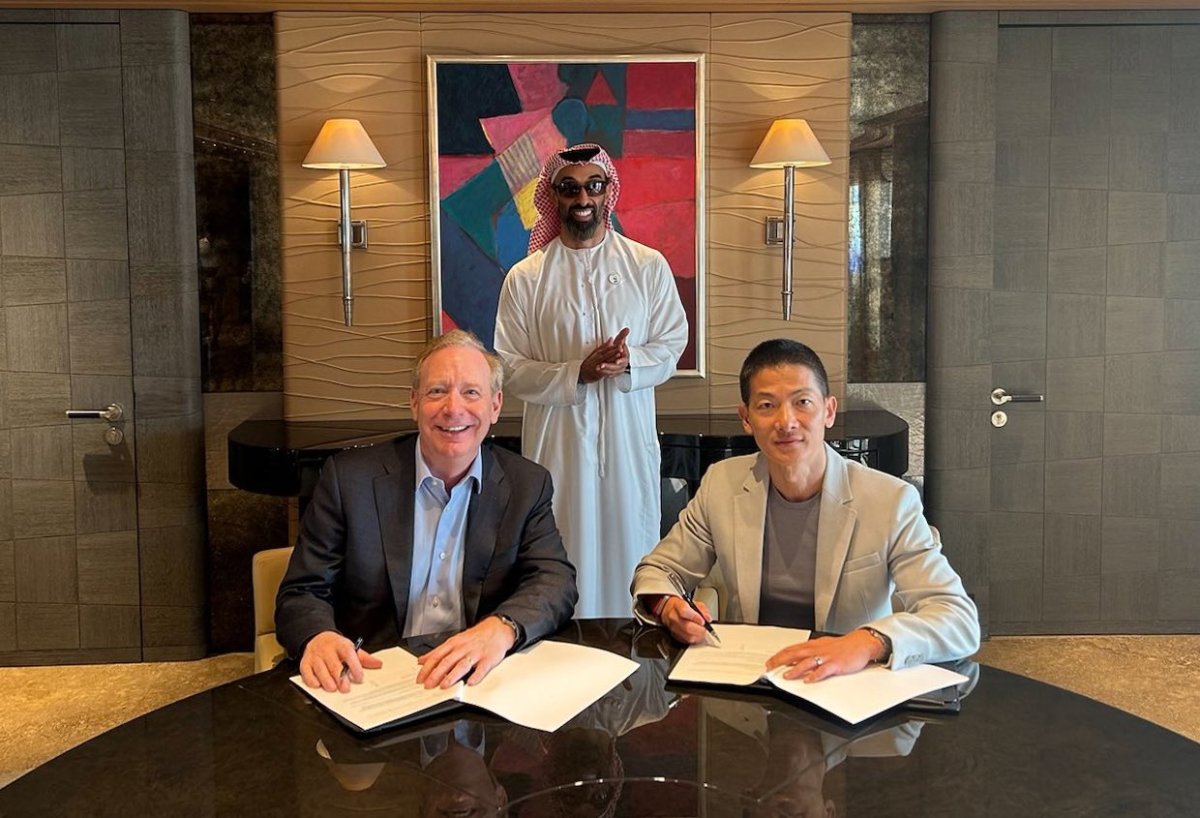As the Gulf region gains growing strategic importance for the tech war between the U.S. and China, Microsoft makes a big move into one of its richest oil countries.
On Monday evening, Microsoft announced a $1.5 billion strategic investment in G42, the Abu Dhabi-based company that has become a major force in the United Arab Emirates’ ambition to be a global leader in artificial intelligence. The minority stake will give Brad Smith, Microsoft’s vice chair and president, a seat on G42’s board of directors.
The deal signifies much more than a mere commercial collaboration between two AI titans. It serves as evidence of the two countries’ strategic positioning amid rising geopolitical tensions.
The funding comes amid U.S. politicians’ escalating concerns over G42’s ties with China. In January, the bipartisan-select House Select Committee on the Chinese Communist Party sent a letter to Commerce Secretary Gina Raimondo calling for the inclusion of G42 on the Entity List, which would bar the Emirati company from accessing sensitive U.S. technologies.
Such a move would put G42 under the same security concerns umbrella as Huawei, which was placed on the Entity List in 2019 and has since been restricted from acquiring critical U.S. technologies, including high-end chips and certain Android services.
Now, the Microsoft deal is a judgment on which superpower G42 has aligned itself with.
Delicate dance
As the UAE navigates a delicate balance between the U.S. and China, its AI poster child G42 has inevitably become a proxy in the tech rivalry between the two superpowers. Though a long-time economic and military ally of the U.S., the UAE has in recent times diverged from Washington’s foreign policy and expanded its partnerships with China, a development that worries Washington.
Last year, the UAE’s president Mohamed bin Zayed attended Russia’s flagship economic forum, which was largely shunned by Western countries in protest of the Ukraine war. The UAE has also increased military cooperation with China, including a plan for their first joint air force training last year.
On the business side, the UAE is attracting Chinese venture capitalists and entrepreneurs who are increasingly excluded from the U.S. market. General managers of Chinese funds have turned to the UAE and its affluent Middle Eastern neighbors for capital as American limited partners retreat from China. Riding on the UAE’s commitment to electrify its economy, China’s electric vehicle manufacturers have been aggressively peddling plug-in models in the market. Last year, premium EV maker Nio secured a handsome $738.5 million investment from an Abu Dhabi-backed fund.
Given the two countries’ increasing economic ties, it’s no surprise that G42, the AI poster child of the UAE, has also forged ties with Chinese firms. What appears to be commercial relationships, however, have greatly concerned U.S. politicians.
In its letter to Raimondo, the House Select Committee on the CCP noted that G42 maintains relationships with companies like Huawei, biotech giant Beijing Genomics Institute (BGI) and Tencent.
The Committee also highlighted the background of G42’s CEO Peng Xiao, who previously held a senior position at a subsidiary of DarkMatter, a company that develops “spyware and surveillance tools that can be used to spy on dissidents, journalists, politicians, and U.S. companies.”
Given these alleged Chinese ties, the Committee is concerned that G42 can be a way for Chinese firms to access U.S. technologies that are otherwise under export control. G42 and its affiliates maintain “extensive commercial relationships” with companies including Microsoft, Dell, and OpenAI.
Picking side
The deal between the two private tech giants represents an uncommon case involving overt backing from their respective governments. According to the announcement, this “commercial partnership is backed by assurances to the U.S. and UAE governments through a first-of-its-kind binding agreement to apply world-class best practices to ensure the secure, trusted, and responsible development and deployment of AI.”
If the deal goes through, it will designate Microsoft as G42’s official cloud partner. Under the agreement, the Emirati company’s data platform and other key technology infrastructure will migrate to Microsoft Azure, which will power G42’s AI product development. G42 already has a partnership with OpenAI that commenced in 2023.
The partnership with Microsoft appears to be a continuation of G42’s ongoing effort to pare back its Chinese influence. The firm has divested from its China-related investments, including TikTok parent ByteDance, and Xiao said late last year that the firm had plans to phase out Chinese hardware because “We cannot work with both sides.”
What Microsoft gains in return is extensive market access to the region, where its AI business and Azure will be implemented across a range of industries like financial services, healthcare, energy, government and education. The partnership will also see the pair launching a $1 billion fund “for developers to boost AI skills” in the UAE and the broader region.
As tech companies have learned in the past few years, it’s become increasingly difficult to avoid picking a side — whether in terms of technology solutions, markets or capital — between the U.S. and China. The developments around G42 demonstrate that even a country like the UAE, which has sought to be a neutral ground between the two rival nations, will ultimately be forced to take a side.

